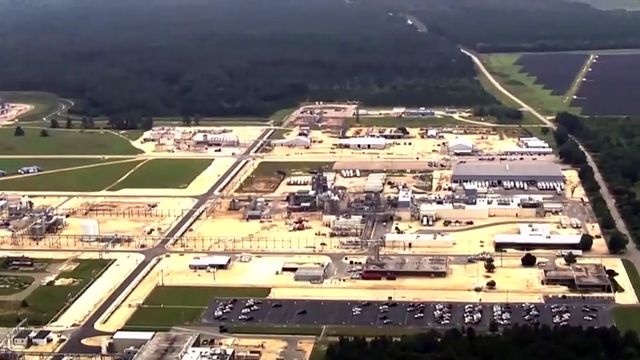Outrage over Chemours' plans to expand production after widespread chemical pollution in NC drinking water
Community groups are planning protests at Chemours information sessions tonight in Bladen County and tomorrow in Brunswick County detailing expansion plans as thousands grapple with toxic chemicals from the company's plant in North Carolina drinking water.
Posted — UpdatedChemours is planning to expand production at their Fayetteville Works chemical plant, despite continued contamination issues in North Carolina drinking water from the facility's chemical pollution.
Public meetings about the expansion are taking place Tuesday in Bladen County and Wednesday in Brunswick County. Many community and environmental groups say they are outraged, including Emily Donovan who founded Clean Cape Fear after she learned toxic chemicals were in the tap water at her home in Wilmington.
Officials say Chemours and its parent company, DuPont, dumped GenX and other toxic chemicals into the Cape Fear River, a drinking water supply for hundreds of thousands of North Carolinians. Exposure to so-called “forever chemicals” has been linked to adverse health effects, including cancer.
Chemours is required to hold the Information sessions to comply with a 2019 settlement agreement addressing its drinking water contamination that now spans more than 3000 square miles.
Dawn Hughes, Fayetteville Works Plant Manager, said in a statement: “The upcoming information sessions will provide the opportunity for us to meet with community members, discuss our plans, gather input, and create greater understanding of how this investment will positively impact the local economy and North Carolina’s manufacturing industry.”’
Chemours said in a press release that it does not project increased emissions with the planned increase in production.
Donovan is skeptical. “It's nearly impossible to avoid [the chemical pollution] because it's in our rainwater, our food supply, and in our blood," she said. "We were overexposed to this chemistry for 40 years, and we simply cannot afford one more drop.”
Jamie White, a resident of Cumberland County, said news of the planned expansion feels like "a slap in the face."
The Brunswick County Democratic Party (BCDP) said in a statement that it strongly opposes any expansion of Chemours operations. “To seek to produce more PFAS and risk further fouling our region’s drinking water, while we are still attempting to learn about the damage already done, is outrageous,” said Shelley Allen, BCDP acting Chair.
Dupont opened the plant in 1971 and it’s been operated by its offspring, Chemours, since 2015.
Both companies are defendants in numerous lawsuits and, according to a recent court claim, both were fraudulently and intentionally shortchanged by corporate restructuring to avoid liability for pollution.
In state supreme court on Monday, North Carolina Attorney Ryan Parks argued for the ability to sue the original Dupont corporation’s new spin-off companies, including Corteva, for the chemical contamination.
“They are paper companies," said Parks. "They have no employees, no direct business operations, no plants or equipment of any kind. They were created by old Dupont to hold old Dupont’s assets.”
With 20 billion dollars in assets parked in those new companies, the court allowing plaintiffs to sue those companies could make payouts to cover the cleanup more feasible.
"Our view is not that our clients turned a blind eye to liabilities,” said Joshua Ackerman, a representative of Dupont's spinoff companies.
As justices weigh arguments in that case and other legal battles rage on, water treatment plants and individual residents including Donovan are left footing the bill for clean water.
Through tears, Donovan said: “It’s not a just system when you have a huge corporation with all the money in the world to solve this problem and they refuse to do it because they’d rather make more money.”
Tuesday, Sept. 20, 5-7 p.m. at Bladen Community College Auditorium (7418 NC Hwy 41 West, Dublin)
Wednesday, Sept. 21, 5-7 p.m. at Leland Cultural Arts Center (1212 Magnolia Village Way, Leland)
Related Topics
• Credits
Copyright 2024 by Capitol Broadcasting Company. All rights reserved. This material may not be published, broadcast, rewritten or redistributed.





